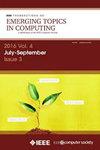Distributed Indexing Schemes for K-Dominant Skyline Analytics on Uncertain Edge-IoT Data
IF 5.1
2区 计算机科学
Q1 COMPUTER SCIENCE, INFORMATION SYSTEMS
IEEE Transactions on Emerging Topics in Computing
Pub Date : 2023-10-26
DOI:10.1109/TETC.2023.3326295
引用次数: 0
Abstract
Skyline queries typically search a Pareto-optimal set from a given data set to solve the corresponding multiobjective optimization problem. As the number of criteria increases, the skyline presumes excessive data items, which yield a meaningless result. To address this curse of dimensionality, we proposed a用于不确定边缘物联网数据 K 主导天际线分析的分布式索引方案
天际线查询通常是从给定数据集中搜索帕累托最优集,以解决相应的多目标优化问题。随着标准数量的增加,天际线会假定过多的数据项,从而产生毫无意义的结果。考虑到数据的不确定性,我们提出了一种 "k$主导天际线",通过放宽维数限制来减少天际线成员的数量。具体来说,每个数据项都与出现概率相关联,而出现概率代表了成为 $k$ 主导天际线成员的概率。由于数据项在数据流中不断出现,相应的 $k$ 主导天际线可能会随时间而变化。因此,一种有效而快速的 $k$ 主导天际线更新机制变得至关重要。在此,我们针对分布式边缘计算环境中的 $k$ 主导天际线提出了两种省时方案:中间索引(MI)和全部索引(AI),其中不相关的数据项可以有效地排除在计算之外,从而缩短处理时间。此外,还通过大量的实验模拟验证了所提出的方案。实验结果表明,与现有方法相比,所提出的 MI 和 AI 方案分别减少了约 13% 和 56% 的计算时间。
本文章由计算机程序翻译,如有差异,请以英文原文为准。
求助全文
约1分钟内获得全文
求助全文
来源期刊

IEEE Transactions on Emerging Topics in Computing
Computer Science-Computer Science (miscellaneous)
CiteScore
12.10
自引率
5.10%
发文量
113
期刊介绍:
IEEE Transactions on Emerging Topics in Computing publishes papers on emerging aspects of computer science, computing technology, and computing applications not currently covered by other IEEE Computer Society Transactions. Some examples of emerging topics in computing include: IT for Green, Synthetic and organic computing structures and systems, Advanced analytics, Social/occupational computing, Location-based/client computer systems, Morphic computer design, Electronic game systems, & Health-care IT.
 求助内容:
求助内容: 应助结果提醒方式:
应助结果提醒方式:


